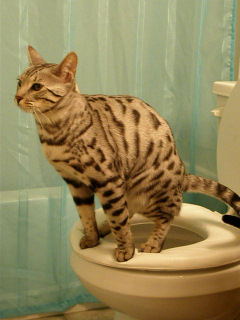Avoid Toilet Emergencies: Never Flush Cat Poop Down Your Toilet - Professional Advice
Avoid Toilet Emergencies: Never Flush Cat Poop Down Your Toilet - Professional Advice
Blog Article
We have stumbled upon the article about Can You Flush Cat Poop Down The Toilet? down the page on the net and think it made perfect sense to share it with you on this site.

Introduction
As cat proprietors, it's necessary to bear in mind how we throw away our feline friends' waste. While it may seem hassle-free to purge cat poop down the toilet, this practice can have harmful effects for both the atmosphere and human health.
Alternatives to Flushing
Fortunately, there are much safer and much more accountable ways to deal with cat poop. Consider the following alternatives:
1. Scoop and Dispose in Trash
One of the most usual approach of taking care of cat poop is to scoop it right into a biodegradable bag and throw it in the garbage. Make sure to make use of a specialized clutter scoop and dispose of the waste immediately.
2. Use Biodegradable Litter
Go with eco-friendly feline trash made from products such as corn or wheat. These litters are eco-friendly and can be safely thrown away in the garbage.
3. Bury in the Yard
If you have a lawn, consider burying pet cat waste in a marked location away from veggie gardens and water resources. Make sure to dig deep enough to stop contamination of groundwater.
4. Set Up a Pet Waste Disposal System
Invest in a family pet waste disposal system specifically created for cat waste. These systems utilize enzymes to break down the waste, reducing smell and environmental effect.
Wellness Risks
In addition to ecological concerns, flushing feline waste can likewise pose health and wellness risks to humans. Feline feces may consist of Toxoplasma gondii, a bloodsucker that can trigger toxoplasmosis-- a possibly severe disease, particularly for pregnant ladies and individuals with damaged immune systems.
Environmental Impact
Flushing feline poop introduces unsafe microorganisms and bloodsuckers into the water system, posturing a considerable danger to marine ecological communities. These impurities can negatively influence marine life and compromise water top quality.
Final thought
Accountable family pet ownership prolongs beyond offering food and shelter-- it additionally includes correct waste management. By refraining from purging pet cat poop down the commode and opting for different disposal approaches, we can decrease our ecological impact and safeguard human health and wellness.
Why You Should Never Flush Cat Poop Down the Toilet
A rose by any other name might smell as sweet, but not all poop is created equal. Toilets, and our sewage systems, are designed for human excrement, not animal waste. It might seem like it couldn’t hurt to toss cat feces into the loo, but it’s not a good idea to flush cat poop in the toilet.
First and foremost, assuming your cat uses a litter box, any waste is going to have litter on it. And even the smallest amount of litter can wreak havoc on plumbing.
Over time, small amounts build up, filling up your septic system. Most litter sold today is clumping; it is made from a type of clay that hardens when it gets wet. Ever tried to scrape old clumps from the bottom of a litter box? You know just how cement-hard it can get!
Now imagine just a small clump of that stuck in your pipes. A simple de-clogger like Drano isn’t going to cut it. And that means it’s going to cost you big time to fix it.
Parasitic Contamination
Believe it or not, your healthy kitty may be harboring a nasty parasite. Only cats excrete Toxoplasma in their feces. Yet it rarely causes serious health issues in the cats that are infected. Most people will be fine too if infected. Only pregnant women and people with compromised immune systems are at risk. (If you’ve ever heard how women who are expecting are excused from litter cleaning duty, Toxoplasma is why.)
But other animals may have a problem if infected with the parasite. And human water treatment systems aren’t designed to handle it. As a result, the systems don’t remove the parasite before discharging wastewater into local waterways. Fish, shellfish, and other marine life — otters in particular — are susceptible to toxoplasma. If exposed, most will end up with brain damage and many will die.
Depending on the species of fish, they may end up on someone’s fish hook and, ultimately on someone’s dinner plate. If that someone has a chronic illness, they’re at risk.
Skip the Toilet Training
We know there are folks out there who like to toilet train their cats. And we give them props, it takes a lot of work. But thanks to the toxoplasma, it’s not a good idea.

We had been introduced to that article on Don’t flush cat feces down the toilet through a good friend on another blog. Feel free to take a moment to share this blog if you enjoyed reading it. Kudos for your time. Visit again soon.
Click Here Report this page